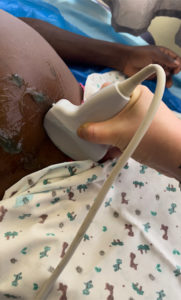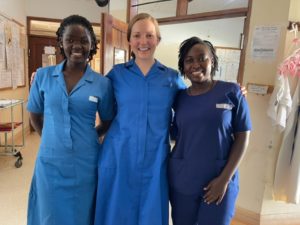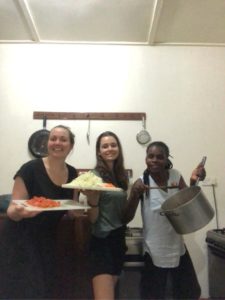It’s my second to last day in Kiwoko. I’m not sure I have said this prior, but Kiwoko is pronounced “chew-woke-oh”. Any K at the beginning of the word becomes a “ch” sound. Sorry it took me until now to mention that! I spent the day visiting my new friends around the hospital to say goodbye. I also returned to maternity to make a few short videos of some ultrasound principles on the requests of the medical officers. At the end of the day, I had a leisurely evening with friends, cooking a local dish of spiced pork and matoke (steamed bananas like plantains). It was delicious!
Tomorrow I will take some time to reflect on my time here as a whole but for now I will list all the medical concepts I have either been introduced to or learned more in depth while here. Hopefully no one thinks I am a bad doctor for just now learning some of these things!
- HIV management in children and pregnant women
- Patient sensitive HIV nomenclature
- Malaria management, its pathogenesis, and prevention strategies
- Malaria prophylaxis side effects (which I may or may not have experienced personally- I’m looking at you Malrone!)
- How to scrub before surgery without sponges
- How to assist in c-sections when the hospital power goes out because it is too hot outside and the generator only operates the one overhead light in the theater
- How to assist in a c-section when it’s an emergency and everyone is speaking Lugandan
- How to resuscitate a baby when it’s an emergency and everyone is speaking Lugandan
- Translating between 3 languages at once
- Understanding the education system an individual learned in helps you communicate more effectively with them
- Tuberculosis signs and diagnosis in children
- How to date a pregnancy without an ultrasound or reliable last menstrual period
- Motivational interviewing from a faith based perspective
- Starting a conversation about work up and treatment with the estimated cost of such things and subsequently negotiating with the patient to complete the most important
- Cutaneous myiasis and the plight of mango flies
- Acute malnutrition signs, diagnosis, and treatment
- The importance of taking a complete, culturally appropriate and specific social history
- Sickle cell disease diagnosis and management (specifically things to avoid in these patients and how to prevent vaso-occlusive crises)
- G6PD clinical presentation
- Diagnosing obstructed labor and potential complications
- The difference between typhoid/typhus and typhoid fever (This has always been confusing to me so I only hope this stays in my brain long enough for the boards exam!)
- How to use a sterile cloth tie to tie off an umbilical cord (as opposed to a plastic clip)
I am sure there is loads more that I have learned, but these points are top of mind and shows the constant learning I have been doing since arriving. Medicine is a profession that emphasizes lifelong learning and a huge reason why I pursued it as a career. At home though I feel I sometimes fall into the trap of “just finishing the day”. I am hoping that the fulfillment I have gotten over the past month of constantly looking for new information will spill over into my work stateside and revitalize my love of learning.
Lugandan word of the day: mukwano (“moo-kwawn-oh”, friend)
Medical learning point of the day: None today- see above.



